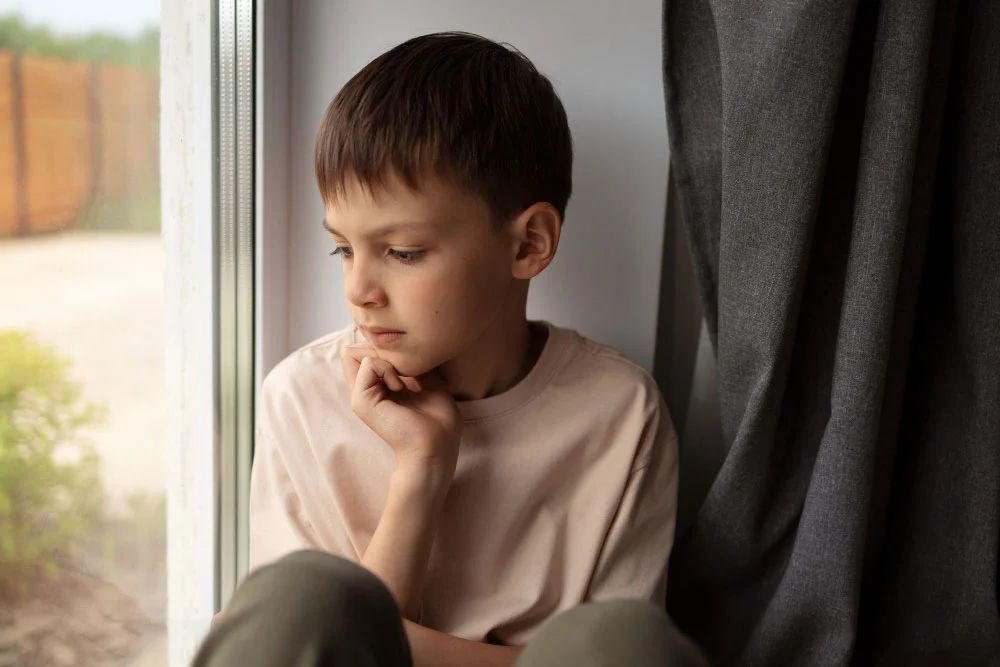9 Things to Say to a Child with Anxiety

Does your child have anxiety? It can be hard to determine what you should say to your child with anxiety because you know that they are going to be fine and they do not need to worry, but they may not believe you. A lot of the common things you might think about saying to your anxious child to try and calm them might actually be making their anxiety worse. In this article, we will look at some of the things you should say to your child with anxiety.
What Not to Say to a Child with Anxiety
Before we dive into some things you can say to your anxious child, let’s take a look at some of the common things that might make their anxiety worse.
- You will be fine.
- I don’t understand what you’re worried about.
- It’s going to be okay.
- It’s no big deal.
- You don’t need to worry about it.
- Big kids/girls/boys don’t get scared by…
- Snap out of it.
- Stop being a worrywart.
- This is silly; you don’t need to worry about this.
- Just calm down.
While you mean well, these phrases can make your child feel like you are invalidating their feelings by hearing you say something like these. These might make them question the way they feel, but it does not give them real information about what they can do to manage the situation or feel better. A child with anxiety feels helpless, overwhelmed, or unsafe. As their parents, it is important that you help them feel safe, in control, and empowered about their situation. Give them a clear message that you understand how they feel and that you will support them in this situation. It can be tricky to balance telling them both that you are here for them and they can handle this.
What to Say to Your Anxious Child
Now that you have a better idea of what to avoid saying to your child with anxiety let’s take a look at what you should try to say and do for your anxious child.
1. I’m here for you.
Anxiety is rooted in our body’s fight or flight response, and the brain perceives the source of the anxiety as a threat. By telling your child that you are there for them, you are helping tell your child’s fight or flight that they are safe.
2. Everyone feels scared/anxious/worried sometimes.
Normalize how they feel because it is perfectly natural for someone to feel anxious or scared, or worried. We all feel that way sometimes, and when your anxiety is spiking, you might feel like you are the only one who feels like that. By normalizing this for your kids, you are helping take some of the power away from that fear.
If you suffer from an anxiety disorder, normalize talking about your anxiety with your child. By doing this, they will feel less alone with theirs, and they might be even more willing to open up to you about their anxiety. You can share with them everything about your anxiety and even what tools work for you, like if you use an app for anxiety relief, a meditation technique, deep breathing, and any other tools. This can help them feel even less alone because you know how to manage yours, so you can help them manage theirs.
3. Let’s take some deep breaths.
As the body prepares to fight or flight, the heart rate and breathing speed up, which can make the anxiety feel even worse for your child. Teach them about taking deep breaths to calm themselves, which sends the brain a message that the threat is gone. Reminding them to take deep breaths and doing it with them to guide them can help make your child feel less anxious, and it teaches them a tool they can use for life to manage stress and anxiety.
4. This feeling won’t last forever.
When someone is in the grips of anxiety, they often feel like it is never going to end, which really just makes it worse. Tell them that this anxiety will go away eventually, and they just need to take some deep breaths and work through it for the anxiety to go away. Sit with them and reassure them that this will not last forever.
5. Tell me how you’re feeling.
Offer your child the opportunity to explain to you how they are feeling and why they feel that way. Listen without interrupting, without judging them. They will feel heard and understood, and by voicing their fears, they will be taking away the power those fears hold over them.
6. Can you draw it?
Art can provide a child with an outlet for them to get out their feelings, especially if they are having trouble putting their fears into words. Getting their feelings out in some way is a great help for anxiety, even if it is just some doodles. You can even use art to have them draw the anxiety monster. Giving it a personification can give them a way to beat it.
7. I know this is hard for you.
Validating your child’s anxiety is crucial to helping them with it. Acknowledge that a situation is difficult for them, so they know they are not just “being silly” or worrying about nothing. Even if the source of their anxiety feels a little silly to you, it feels real to them, and by acknowledging that, you can help make them feel better.
Related reading: How To Deal With Test Anxiety In Kids?
8. What helped last time?
Help your child think about what worked for them to manage their anxiety last time. This will remind them that they have things they can do to get through their anxiety today. It can also help distract them by getting them to focus on something other than their current anxiety.
9. It’s okay to feel scared.
Sometimes, when a child is scared or anxious, we unintentionally send them the message that the way they feel is wrong. That message just increases their anxiety since they are wrong to be feeling that way. Validate their fear and let them know it is okay for them to be scared, no matter how small this fear seems to you.

About the Author: Auz Burger is a freelance writer and an expert in mental health. She has a BA from Washington State University and has been writing and editing professionally for over a decade.
